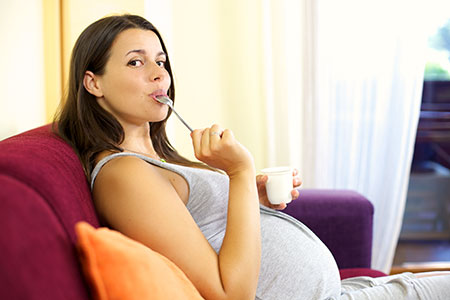
Handle pregnancy cravings by working them into your diet in moderation or searching for healthful substitutes.
Expectant mothers should be aware of foods they shouldn’t eat, but knowing what to include in a pregnancy diet is equally important.
Paula McIntyre, a Marshfield Clinic registered dietitian, covered the basics of eating well for a healthy pregnancy.
Eating for two doesn’t mean twice as much
A healthy pregnancy diet includes three meals a day plus snacks if you need them. You will need to eat more as pregnancy progresses, but you don’t need to double your food intake, McIntyre said.
“Calorie needs don’t change in the first trimester,” she said.
Women who were at a healthy weight when they got pregnant need 350 extra calories per day in the second trimester and 450 extra calories in the third trimester.”
Women who were overweight or underweight when they got pregnant should talk to their OB/GYN provider or a dietitian about their calorie needs.
The additional food you eat should be packed with nutrients. Calcium, iron and folic acid are especially important for baby’s development. Leafy green vegetables, fruit, lean meat, legumes, nuts and low-fat dairy are good sources of these nutrients. All pregnant women should take a prenatal multivitamin in addition to the nutrients they get from food.
Skip these foods
Some foods present a danger to your developing baby, so you should avoid them while you’re pregnant. All foods should be prepared using safe food handling methods.
Here’s a list of foods you should skip until baby is born:
- Alcohol. The advice is clear – avoid any alcohol consumption during pregnancy. Drinking puts baby at risk for serious physical and cognitive problems.
- Unpasteurized dairy and cold cuts. These foods are known to carry harmful bacteria called listeria. Avoid unpasteurized milk and soft cheeses like feta, blue cheese and queso blanco. Make sure cold cuts and hot dogs are heated to steaming.
- Raw or undercooked meat. You’ll have to give up raw sushi and pass on medium-rare steak to avoid harmful bacteria.
- Raw eggs. Raw eggs carry bacteria that can be harmful to unborn babies. Steer clear of raw cookie dough and homemade sauces or dressings that contain raw eggs.
- Some fish. Avoid fish with high mercury levels like shark, swordfish, king mackerel, tilefish and albacore tuna. Check the Wisconsin Department of Natural Resources website for safe eating tips for fish caught in local waters. Limit your intake of safe fish and shellfish to 12 oz. per week.
- Saccharin. Expectant moms shouldn’t consume saccharin, also known by the brand name Sweet‘N Low. Other artificial sweeteners are safe in moderation during pregnancy.
Avoid caffeine during the first trimester to reduce risk of miscarriage. Limit caffeine to 200 mg or no more than two cups of coffee per day during the second and third trimesters.
How to handle cravings
Hormone changes, emotions and the need for more energy can cause cravings.
“If cravings happen, you can work them into a reasonable meal plan or find substitutes,” McIntyre said. “Try a Fudgsicle to satisfy the chocolate cravings with fewer calories than a large candy bar.”
Talk to your doctor if you experience cravings for non-food items. This condition, called pica, isn’t safe for moms or unborn babies.
A Marshfield Clinic dietitian can help you plan a healthful pregnancy diet.
Request an appointment with a dietitian.
Related Shine365 posts
Prenatal exercise: Is your fitness routine safe?
Pregnancy and heart health: What you need to know
Can I have that if I’m breastfeeding?

